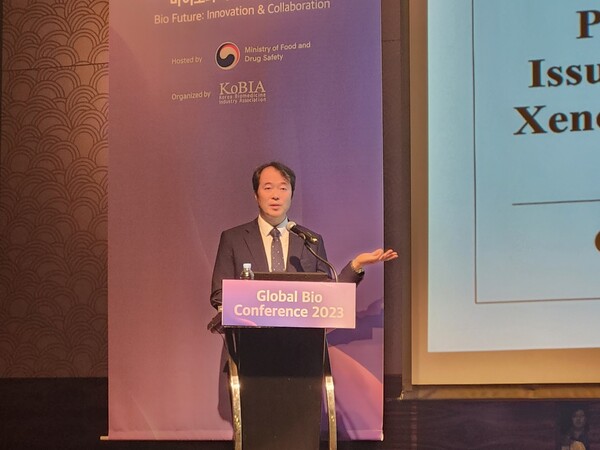As the increasing demand for transplants cannot be filled with human-to-human organ transplants, this has shifted the focus to animal-to-human transplants, better known as xenotransplants.
Accordingly, Optipharm CEO Kim Hyun-il revealed that his company is planning to fill this void and is currently engaged in preclinical trials for six kidneys, six hearts, and six islets and plans to start xenotransplant clinical trials in the fourth quarter of 2024.

Kim presented the global trends of present and future of xenotransplantation research while also presenting the local context in regards to research and pre-clinical studies of his company at the Global Bio Conference (GBC) 2023 in Seoul, Thursday.
Recently, his company announced in July that that a monkey transplanted with a pig's kidney achieved a survival record of 221 days, which is approximately twice as many days of the previous domestic survival record of 114 days.
However, he noted that researchers from the University of Alabama at Birmingham (UAB) conducted the world’s first pig-to-human kidney in 2021 for brain-dead patients. Furthermore, he highlighted a more recent xeno-heart transplantation to cardiac patients in 2022 by Revivicor, a U.S.-based company specializing in providing organs from gene-edited pigs to overcome the human transplant shortage.
However, the pig that Revicor used is comparatively larger than human hearts and can thus experience compatibility issues in humans. Accordingly, he mentioned that progress has sourced mini pigs with similar-sized organs to humans being 94 percent similar to hearts and 91 percent similar to kidneys.
Kim also mentioned that there is a lot of interest in this field with $14.5 million in national research funds from the Ministry of National Defense to develop xeno-transfusionable red blood cells based on transgenic pigs for seven years. Furthermore, he mentioned two other national projects funded by the Ministry of Health and Welfare (MOHW). The first one invests $15.3 million for six years to develop xeno-solid organs and the other provides $13.8 million for six years to develop xeno-cells and tissues.
Additionally, the Ministry of Food and Drug Safety (MFDS) has also published guidelines in October 2022 to support the development of xenotransplantation products, through the ‘Xenotransplantation Product Quality, Pre-clinical, and Clinical Evaluation Guidelines.’
Accordingly, Kim noted that Optipharm currently developed transgenic source pigs with blood type O, the most common blood type, with porcine endogenous retroviruses C (PERV-C negative), quadruple knock-out, and quadruple knock-in properties.
However, he noted that there can be compatibility issues and so standard human leukocyte antigens (HLA) tests should be conducted and supplemented with immune suppression treatment to ensure optimal compatibility with the donor.
“We are also aiming to develop transgenic pigs that fit a broader range of human characteristics with blood O, PERV-C negative, quadruple knock out, and human complement regulatory protein transgenes such as CD39, TBM, CD55, CD59, CD46, and CD47, to extend survival times and suppress chances of organ rejection,” said Kim.
With the advancements in transgenic animals that Optipharm is working on, Kim predicts that fewer immune suppression treatments will be required as you can alter the genome by transferring genes from the human to increase compatibility.
Related articles
- Kidney xenotransplant from pig to monkey shows promising 221-day survival record
- Robotic kidney transplantation from brain-dead donor performed successfully
- Breakthrough in stem cell transplants: half-matched donors now viable for blood cancer treatment
- Patient with multiple heart surgeries thrives after successful heart transplant at Severance

